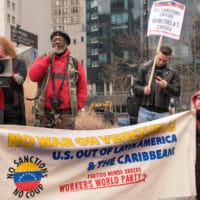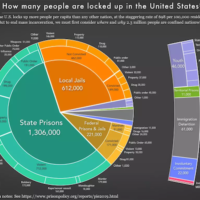-
Trump’s narcoterrorism indictment of Maduro already backfires
Among those indicted by the U.S. was Cliver Alcalá, a retired general who is considered the military leader of the pro-Juan Guaidó forces. Soon, Alcalá posted videos that threaten to cause further splits in the opposition and could result in the arrest of Guaidó.
-
Growing xenophobia against China in the midst of CoronaShock
Violent attacks against Asians in the United States has spiked as a consequence of the stigma driven by the Trump administration.
-
The Federal Reserve’s Coronavirus crisis actions, explained (Part 3)
The International Aspects
-
Amid coronavirus crisis, China demonstrates that an alternative to the US-led, neoliberal order is possible
The bankruptcy of neoliberalism has been highlighted by the vastly different responses of the world’s two most powerful countries to the coronavirus pandemic.
-
Cuba sends doctors, nurses worldwide in COVID-19 fight
Cuba on March 28 sent a team of 39 doctors and nurses to Andorra, the thirteenth medical brigade the country has dispatched overseas to combat the COVID-19 pandemic.
-
‘For common benefit of all,’ Ireland nationalizes hospitals for duration of Coronavirus crisis, sparking demand for U.S. to follow suit
“How wonderful is this. A beautiful silver lining.”
-
Unsanitized: Bailouts, a tradition unlike any other
The money the Federal Reserve will give to corporate giants, approximately.
-
The Federal Reserve’s Coronavirus crisis actions, explained (Part 2)
Hear comes the corporate debt purchases.
-
COVID-19 and Circuits of Capital
COVID-19, the illness caused by coronavirus SARS-CoV-2, the second severe acute respiratory syndrome virus since 2002, is now officially a pandemic. As of late March, whole cities are sheltered in place and, one by one, hospitals are lighting up in medical gridlock brought about by surges in patients.
-
Letter from Catalonia: Alarming measures
I’m in a small city in Catalonia called Olot, not far from the Pyrenees. I came here because I knew the coronavirus lockdown would be much rougher in Barcelona. Still, people walk around with masks and keep social distances, barely going out.
-
We won’t go back to normal, because normal was the problem
It is hard to remember that just a few weeks ago, the planet was in motion. There were protests in Delhi (India) and Quito (Ecuador), eruptions against the old order that ranged from anger at the economic policies of austerity and neoliberalism to frustration with the cultural policies of misogyny and racism. Ingeniously, in Santiago (Chile), during its wave after wave of protests, someone projected a powerful slogan onto the side of a building: ‘we won’t go back to normal, because normal was the problem’.
-
As the World tackles the COVID-19 pandemic, the U.S. raises the pressure on Venezuela
In a press conference on March 26, it was almost comical how little evidence the U.S. Department of Justice provided when it accused Venezuela’s President Nicolás Maduro and several of the leaders of his government of narco-trafficking. The U.S. offered $15 million for the arrest of Maduro and $10 million for the others. Maduro, U.S. Attorney Geoffrey Berman said dramatically, “very deliberately deployed cocaine as a weapon.” Evidence for this? Not presented at all.
-
Venezuela’s Coronavirus response might surprise you
Within a few hours of being launched, over 800 Venezuelans in the U.S. registered for an emergency flight from Miami to Caracas through a website run by the Venezuelan government. This flight, offered at no cost, was proposed by President Nicolás Maduro when he learned that 200 Venezuelans were stuck in the United States following his government’s decision to stop commercial flights as a preventative coronavirus measure.
-
Venezuela: U.S. blocks flights to repatriate citizens amid COVID-19
Arreaza reiterated that the request for humanitarian flights responds to a request made by Venezuelans themselves to the Venezuelan Attention System in the United States.
-
The Federal Reserve’s Coronavirus crisis actions, explained (Part 1)
The Federal Reserve has taken an extraordinary amount of actions over the past two weeks (most of which have happened over the course of 8 days from March 15th to March 23rd) to calm financial markets and sustain the flow of credit to households and businesses to respond to the coming Coronavirus-induced depression.
-
How market reforms made the NHS vulnerable to pandemics
A 2014 report warned that reforms to the NHS would make it vulnerable to pandemics – by making staff redundant, undermining public health and defining spare capacity as waste. It was ignored.
-
Arrest the virus, free the prisoners!
We cannot allow the capitalist ruling class to turn a blind eye to the plight of the incarcerated population — not in general, nor in the particular circumstance of the global pandemic of Covid-19. In the U.S., there are 2.3 million human beings in state, federal, and county jails and more than 52,000 in immigrant detainment camps.
-
Donald Trump says America’s ventilator shortage was “unforeseen.” Nothing could be further from the truth
IN RECENT DAYS, President Donald Trump has repeatedly defended his administration against the suggestion that the government is failing to secure enough ventilators – medical devices that help Covid-19 patients breathe and can save the lives of those suffering serious respiratory distress.
-
What the government needs to do next
Tax rebates, tax cuts and business bailouts will not solve this crisis. Here’s what’s needed.
-
Is capitalism a disease?
When health policy is looked at from the point of view of which issues involve a direct confrontation with ruling-class interest, which involve simply relative benefits to a class, and which are neutral, we can predict which kinds of measures are possible—highlighting the lie in the notion society is trying to improve health for all.




















